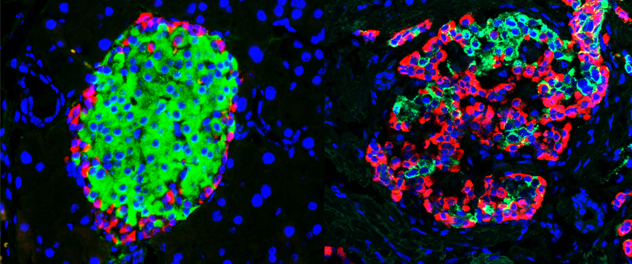 Restoring and regenerating pancreatic beta cell function in diabetes mellitus
Restoring and regenerating pancreatic beta cell function in diabetes mellitus
Dr. Matveyenko's Islet Regeneration Lab at Mayo Clinic is developing novel therapeutic and preventive approaches to restore and regenerate pancreatic beta cells as a critical step in combating diabetes mellitus, a disease that affects hundreds of millions of people worldwide.
Overview
The incidence of diabetes mellitus has reached epidemic proportions worldwide. This debilitating disease greatly increases population morbidity and mortality and places a substantial burden on health care systems globally. For this reason, an increased understanding of the molecular and physiological mechanisms underlying the induction of diabetes is essential to develop novel therapeutic and preventive approaches.
Compromised beta cell function is a hallmark abnormality in diabetes mellitus. The development of novel therapeutic and preventive approaches to restore and regenerate beta cell numbers and respective function in diabetes is a critical step in combatting this debilitating disease.
The pathophysiology of diabetes is complex. However, evidence suggests that pancreatic beta cell failure is a hallmark abnormality responsible for the failed regulation of glucose homeostasis, induction of hyperglycemia and onset of numerous tissue complications.
A key feature precipitating the onset of hyperglycemia in both type 1 and type 2 diabetes is the induction of beta cell dysfunction and loss of beta cell numbers, collectively called beta cell mass. In type 1 diabetes, beta cell loss and dysfunction occur due to an autoimmune attack leading to near-total ablation of beta cells. People with type 2 diabetes experience cell loss and dysfunction due to environmental triggers, such as obesity. The development of successful diabetes treatment strategies requires regeneration and restoration of appropriate beta cell numbers and function.
Research focus areas
Current research in the Islet Regeneration Lab focuses on basic science and translational research into the pathophysiology of diabetes, with particular emphasis on understanding the role of gene-environment interaction in the regulation of pancreatic beta cell function, survival and regeneration. To accomplish these goals, Dr. Matveyenko's lab uses an integrative approach, ranging from cellular, molecular and biochemical studies to in vivo physiology in genetic and environmental rodent models of diabetes and obesity. Another focus of research is to discover the role of circadian clock genes and the circadian system as a novel regulator of beta cell function and regeneration.